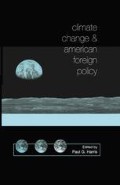Abstract
This chapter analyzes the role of the United States in international climate policy from the theoretical viewpoint of French regulation theory. I have chosen regulation theory because this approach tries to capture the interconnectedness of state and economy, as well as the different levels of policy. The chapter begins with a short introduction to regulation theory, followed by a comparison of regulation theory and regime theory (the majority of authors who carry out research on international environmental policy use the regime analysis approach) in order to show the peculiarities of the regulation approach. Some general remarks on the dynamics of climate diplomacy are made. Then the position of the United States in this field is analyzed, and the degree of success in implementing U.S. climate change policy is discussed, using the Kyoto Protocol as an example. The significance of economic and domestic factors in shaping the U.S. position in international environmental policy is shown, highlighting two important actors: the Senate and industrial lobbies. In concluding remarks, a “regulationist” reformulation of the crisis of hegemony is used to synthesize the material presented in this chapter.
Access this chapter
Tax calculation will be finalised at checkout
Purchases are for personal use only
Preview
Unable to display preview. Download preview PDF.
Notes
Robert Boyer, The Regulation School, A Critical Introduction (New York: Columbia University Press, 1990): xviii.
Alain Lipietz, “Vom Althusserismus zur ‘Theorie der Regulation,’” in Hegemonie und Staat, Kapitalistische Regulation als Projekt und Prozess, edited by Alex Demirovic et al. (Münster: Verlag Westfälisches Dampfboot 1992): 49.
Karl Marx, A la redaction de Otetchestvennie Zapiski, in Marx/Engels, Gesamtausgabe (MEGA), (Berlin: Band 25, 1985): 112.
Alain Lipietz, “Imperialism or the Beast of the Apocalypse,” in Capital and Class no. 22 (1984): 86.
Alain Lipietz, “De l’approche de la régulation à l’écologie politique: une mise en perspective historique,” Interview de G. Cocco, F. Sebaï, C. Vercellone, in École de la régulation et critique de la raison économique, edited by Farida Sebaï and Carlo Vercellone (Paris: Editions L’Harmattan, 1994): 79.
Jacques Mistral, “Régime international et trajectoires nationales,” in Capitalismes fin de siècle, edited by Robert Boyer (Paris: Presses universitaires de France, 1986): 181.
Alain Lipietz, “Akkumulation, Krisen und Auswege aus der Krise: Einige methodische Überlegungen zum Begriff ‘Regulation,’” Prokla 58 (1985): 126.
Alain Lipietz, Towards a New Economic Order: Postfordism, Ecology and Democracy (Cambridge: Polity Press, 1992): 112.
Krasner, Stephen, D.,ed., International Regimes (Ithaca: Cornell University Press, 1983): 2.
Alain Noël, “Accumulation, Regulation and Social Change: An Essay on French Political Economy,” International Organization, vol. 41, no. 2 (1987): 331.
Nazli Choucri, Global Accord, Environmental Challenges and International Responses (Cambridge: MIT Press, 1993): 9.
Thomas Bernauer, “The Effect of International Environmental Institutions: How We Might Learn More,” International Organization, vol. 49, no. 2 (1995): 364.
Detlef Sprinz, and Urs Luterbacher, eds., International Relations and Global Climate Change, PIK Report no. 21, Potsdam 1996: 45.
Regulation and international regulation are historical chance discoveries. That is why the research project that laid the foundations for this article stressed the analysis of a historical search process. See Andreas Missbach, Das Klima zwischen Nord und Süd, Eine regulationstheoretische Untersuchung der Nord-Süd-Konflikte in der internationalen Klimapoliti, (Münster: Verlag Westfälisches Dampfboot, 1999).
Matthew Paterson, Global Warming and Global Politics (London: Routledge, 1996): 56–57.
Craigh P. Collins, “Climate Change Negotiations Polarize,” Ambio, vol. 20, no. 7, (1991): 341.
These calculations are my own; emissions values from Climate Action Network Europe, Independent NGO Evaluations of National Plans for Climate Change Mitigation, OECD Countries, Fifth Review, September 1997: 100.
William A. Nitze, “A Failure of Presidential Leadership,” in Negotiating Climate Change, The Inside Story of the Rio Convention, edited by Irving M. Mintzer and J. A. Leonard (Cambridge: Cambridge University Press, 1994): 189.
Gavin Wright, “The Origins of American Industrial Success, 1879–1940,” The American Economic Review, vol. 80, no. 4 (1990): 661.
Elmar Altvater, Der Preis des Wohlstands, oder Umweltplünderung und neue Welt(un)ordnung (Münster: Verlag Westfälisches Dampfboot, 1992): 74.
World Resource Institute, World Resources 1996–97 (New York: Oxford University Press, 1996): 326ff.
Enrico Augelli and Craig Murphy, America’s Quest for Supremacy and the Third World: A Gramscian Analysis (London: Pinter, 1988): 145.
Steve Rayner, “The Greenhouse Effect in the USA: The Legacy of Energy Abundance,” in Energy Policies and the Greenhouse Effect, Volume II: Country Studies and Technical Options, edited by Michael Grubb (Aldershot: Dartmouth, 1991): 227.
Alan S. Manne and Richard G. Richels, “CO2 Emission Limits: An Economic Cost Analysis for the USA,” The Energy Journal, vol. 11, no. 2 (1990): 70–72.
Konrad von Moltke, “External Perspectives on Climate Change, The U.S. Perspective,” in Politics of Climate Change: A European Perspective, edited by Tim O’Riordan and Jill Jäger (London: Routledge, 1996): 331.
William D. Nordhaus, “Climate Amenities and Global Warming,” in Climate Change: Integrating Science, Economics, and Policy, edited by Nebojsa Nakicenovic et al. (Laxenburg: IIASA, International Institute for Applied Systems Analysis, 1996): 43.
Reinhard Loske, Klimapolitik im Spannungsfeld von Kurzzeitinteressen und Langzeiterfordernissen, (Marburg: Metropolis, 1996): 267.
J. W. Anderson, Climate Change: Clinton and Kyoto (Washington, DC: Resources for the Future, November 1997): 17.
Michael Toman et al., A Summary of U.S. Positions on Climate Change Policy Washington, DC: Resources for the Future, November 1997): 15.
Alfredo C. Robles, Jr., French Theories of Regulation and Conceptions of the International Division of Labour (New York: St. Martin’s Press, 1994): 120.
Editor information
Editors and Affiliations
Copyright information
© 2000 Paul G. Harris
About this chapter
Cite this chapter
Missbach, A. (2000). Regulation Theory and Climate Change Policy. In: Harris, P.G. (eds) Climate Change and American Foreign Policy. Palgrave Macmillan, New York. https://doi.org/10.1007/978-1-349-62978-7_7
Download citation
DOI: https://doi.org/10.1007/978-1-349-62978-7_7
Publisher Name: Palgrave Macmillan, New York
Print ISBN: 978-1-349-62980-0
Online ISBN: 978-1-349-62978-7
eBook Packages: Palgrave Political & Intern. Studies CollectionPolitical Science and International Studies (R0)

